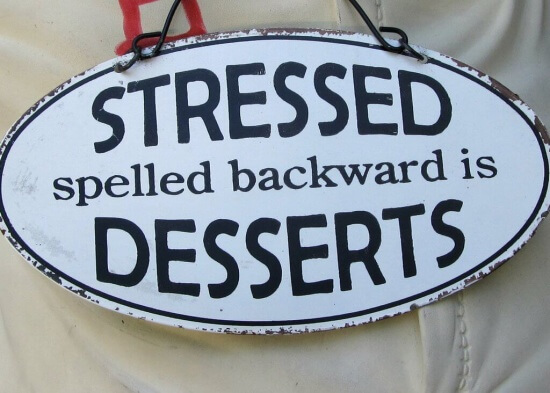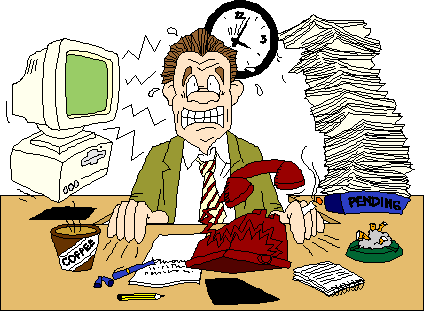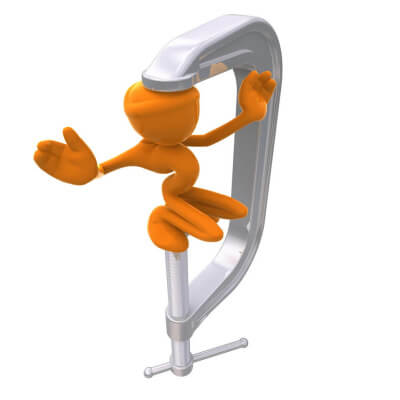As a college student, you probably get constant reminders from your mom to relax, or get advised by your professor to take it easy at one time or another. With so much focus on getting that A in your bio-psychology class, you overlook the little progress you make in your everyday life, like finally scheduling your own doctors appointment. Let’s be honest, couldn’t we point the finger at ourselves for this? Sure, professors are the ones that assign three papers due on the same day, but guess who’s the crazy one that signed up for seven extracurriculars? Ding, ding, ding — you are. We may think that we know what stresses us out, but in reality, there are multiple theories to consider.
We don’t know any different

True story: On MLK Day last year a few of my friends said they felt guilty for taking the night off from homework, even after they’d been busting their butts over assignments and applications all weekend. When free time arises and your Netflix queue magically opens up, our minds unwillingly begin to race with all the things we could do to stay ahead of the pack. Students feel the need to secure Internship A and Job B along with GPA C to ensure any success or future happiness. In other words, college students have so many things to do on a regular basis that we just don’t know how to take a break and actually slow down.
We simply can’t help it… or can we?

All too often those paper deadlines loom in the distance and we can’t stop thinking of our to-do lists, even if we’re chilling watching Grey’s Anatomy on a Saturday night. Our body responds with physiological stress based on external circumstances. This culture of stress feeds on itself; the more people talk about how freaked out they are about a presentation, the more stressed you become, too. Instead, consider stress as something you can manage and use for your benefit.
Alissa Mrazek, a Northwestern doctoral student of psychology, teaches a workshop about self-control and shares tools for stress management with college students. “Research suggests that viewing [physical symptoms of stress] as a sign that ‘my body is helping me prepare for something important’ can substantially mitigate the harmful effect of stress on your body,” Mrazek said. The basic idea is this: instead of letting stress wear you down, you can change your mindset and use that stress as adrenaline to write those last three pages of your Othello paper.
We get more done when we add a little extra pressure

In high school, we were left to our own devices when it came to going the extra mile so we could read that congratulations letter from our dream school. Now we lose sleep and sanity over a piece of paper that we can hang in our office then never touch again. Overscheduling can easily turn us into those students that cry in the library wondering why they didn’t become strippers. But we can’t seem to shake the theory that the more stress we put ourselves under, the more work we will get done. “In one of my most recent studies, several participants expressed the belief that procrastination is beneficial… [but] being stuck in that trap is more likely to lead to chronic stress,” Mrazek said.
And we secretly like it

Have you ever noticed those college students that like to turn their workloads into competition with one another? One person mentions the two papers that she has due on Wednesday while another boasts that he has three papers and a group project due by the start of the work… are congratulations in order? Students want to take pride in their accomplishments before they even really do them.
Sure, the pressure might not feel good at the time, but neither does a hangover—and plenty of students bite that bullet so they can have a little fun. “Students stress themselves out because we live in a culture telling us that getting a job will be extremely challenging, making it hard to enjoy the moment,” Northwestern sophomore Sam Trotter said. Students spend so much time working toward happiness instead of actually experiencing it. We probably convince ourselves that we love this self-created pressure just so we have an easier time living with it. While it may seem like “the cool thing” to publicly dwell on potential stressors; you should also make the time to discuss the importance of Ryan Gosling’s body of work and the latest BuzzFeed list.
Stress and Your Health
Written by Cara Hedgepeth, junior, journalism, University of Maryland
We’ve all been there. It’s midterm week and you have three papers due and two exams. You’re running on three hours of sleep and about 15 cups of coffee.
Unfortunately, stress is an all-too-familiar feeling for most college students.
“It’s like a sense of impending doom that just does not go away,” said University of Maryland junior Rebecca Morgenstern. “I often feel like I have a whole lot of work all at once.”
While most of us accept that stress will be a part of our lives, it can become a major disruption, especially when those stressful feelings manifest themselves in physical symptoms.
Tracy Zeeger, who works at the University of Maryland’s Center for Health and Well Being, said when people are stressed out, they can experience rapid breathing, a fast heart rate and dilated pupils. She said, “[People may also] be forgetful, [their hands] may feel sweaty and blood will rush from the core of [the] body to our extremities.”
Zeeger said there are strategies to help reduce these symptoms. Relaxation techniques such as meditation and deep breathing can be incredibly effective.
But Zeeger said there is one thing that students can do to stay healthy. “Prevent stress in the first place.” This means practicing good time management skills, making feasible to-do lists and breaking bigger tasks into smaller ones. “Sleep is also a major factor in reducing stress and feeling good,” Zeeger said.
But Morgenstern said a lack of sleep is part of a vicious cycle. “If I wasn’t stressed, I would have more time to sleep well and relax which would keep me healthier and happier.”
Students might find other releases that help them to relieve stress. Finding a strategy that works for you can be key. For Morgenstern, that release has come in the form of exercise. “Nothing makes me feel better than just running and listening to my music to get out my pent up anxiety and stress,”Morgenstern said.
*Updated January 14, 2016 by Cara Hedgepeth to include “Stress and Your Health.”



















